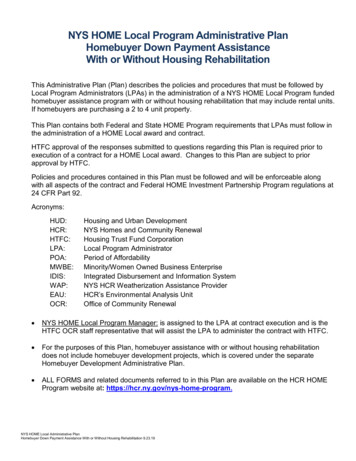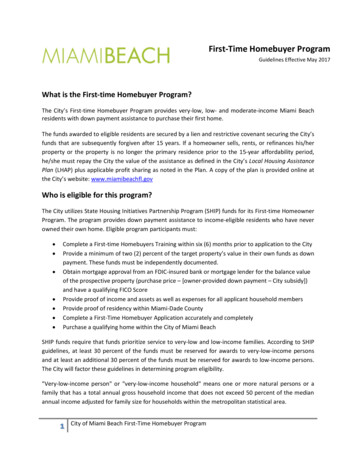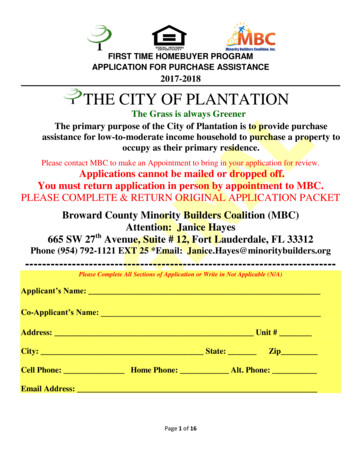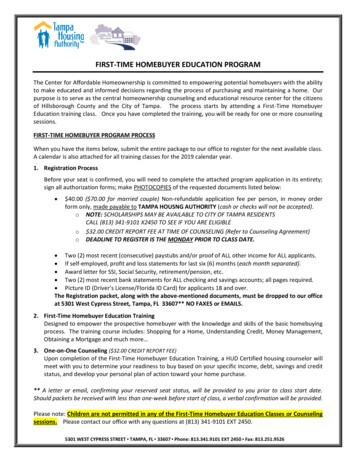
Transcription
First-Time HomebuyerRoadmapNMLS# 464603
Let theJourney Begin!Know-how turns someday into moving day.Buying your first home can be exciting and stressfulall at the same time. At People’s United Bank ourexperienced mortgage experts are here to help youevery step of the way during this process and wantto ensure that you find the loan that suits yourTable of Contentsneeds best.About People’s United Bank2Step 1: Homebuyer Education3Classes and Resources3Is Homeownership Right for You?4This First-Time Homebuyer Roadmap will provideyou with the information you need to makeStep 2: Decide What You Can Afford5informed decisions during the home buyingStep 3: Choose the Right Home6Types of Homes6process. We hope you find it helpful. When you’reSelecting a Real Estate Agent7Making an Offer7Step 4: Find the Right Mortgage9Types of Mortgages9What to Expect During theApplication Process10Frequently Asked Questions11Glossary14ready, our mortgage experts are here to assist you.1
About People’s United BankFounded in 1842, People’s United Bank (NASDAQ : PBCT) is a diversified financial servicescompany that provides a broad array of consumer, commercial, investment, insurance,wealth management and trust services.Our over 5,000 employees focus on providing an extraordinary customer experiencethrough a network of branches located in Connecticut, New York, Massachusetts, Vermont,New Hampshire and Maine. In addition, seven-day banking is available inside Stop & Shoplocations across Connecticut and New York.Our story reflects not only our banking history, but also our fundamental principles. AtPeople’s United Bank, we believe that, by offering empathy and expertise to our customers,giving back as partners in our communities, and valuing the know-how of our employees,we all succeed together.Come discover what our know-how can do for you!Visit a Branch2peoples.com855-782-LEND
STEPHomebuyer Education1Choosing to purchase your first home is an important decision.To learn more about buying a home, many local non-profit agencies throughout your community offer a First-Time Homebuyercourse where you’ll receive more detailed information about what it takes to purchase your own home. These agencies provide both one-to-one interviewing and group seminars. Be sure to attend a certified education program which ensures thatthe information provided to you is accurate and current.The homebuyer resources listed below can assist you in locating non-profit agencies offering certified programs near you.MASSACHUSETTSFirst-time HomebuyerClasses & ResourcesCitizens’ Housing and Planning Association (CHAPA)chapa.orgA non-profit umbrella organization for affordablehousing and community development activities inMassachusetts.CONNECTICUTNATIONALNational Foundation for Credit Counselingnfcc.orgA large national non-profit credit counseling networkthat is dedicated to helping low income households.Connecticut Housing Finance Agency (CHFA)chfa.orgA leader in creating affordable housing opportunitiesfor families and individuals in Connecticut.NEW YORKNeighborWorks Americanw.orgA nationwide network of community developmentand affordable-housing organizations with over 240members.The State of New York Mortgage Agency (SONYMA)nyshcr.orgOffers five mortgage programs to assist first-timehomebuyers with the purchase of a home in New YorkState.The US Department of Housing and UrbanDevelopment (HUD)Hud.gov/offices/hsg/sfh/hcc/hcs.cfmIn charge of certifying qualifying non-profit homeownership programs. Ensures these programs areaccurate and consistent.The New York Mortgage Coalition (NYMC)nymc.orgA non-profit collaboration of financial institutions andcommunity housing agencies focused on expandinghomeownership opportunities to low income andminority individuals.3
Is Homeownership Right For You?Before purchasing a home, it is important to know the benefits of renting vs.buying a home to ensure you make the choice that is right for you.4FLEXIBILITY:Renting a home gives you time to discover communities and neighborhoods for your family. Also, sinceyou are not committed to homeownership, you canadapt to a career or income change more easily.NO MAINTENANCE COSTS:When you rent a property, the landlord is generallyresponsible for all maintenance and repair bills.FIXED RENT AMOUNT:First-timeHomebuyerSincerent amounts areusually fixed for thespan Classesof the lease agreement,you know the& Resourcesamount of money you owe every month. This allowsyou to budget your money more efficiently than youwould if you were a homeowner paying propertytaxes that tend to fluctuate yearly.DELINQUENT CREDIT:If you have poor credit, you can begin to builda positive credit history by paying your rent ontime each month. A history of on-time rental payments can improve your borrowing ability when it’stime to qualify for a mortgage.EQUITY:When owning your own home, you can increase yourdegree of ownership with every mortgage payment.If the equity of your home grows greater than 20%,you may be able to borrow against your equity inorder to pay for a major purchase in the future.DECISION-MAKING CONTROL:You have greater flexibility to improve your homeand make changes that will improve the value of yourhome.TAX DEDUCTIONS:If you own your own home, you may be ablededuct your mortgage interest and propertytaxes. (Please consult your tax advisor.)CERTAINTY:You don’t have to worry about your leaseending and do not have to worry about theactions of your landlord.
STEP2Decide What You Can AffordDetermining what you can afford is a key step in the home buying process.Knowing how much of a mortgage you’re approved for gives you more buying power. Your purchase offer will stand out fromthe others when you also include a committment letter, which is proof of your ability to obtain a mortgage from a lender.At People’s United Bank, we offer Homebuyer Advantage, a full mortgage pre-approval - a step beyond the pre-qualificationprocess most lenders provide. We can pre-approve you for a conforming or jumbo product, fixed or adjustable rate loan program. To apply for a mortgage or a pre-approval, we’ll need information about your income, credit and assets. If you qualify,we’ll provide you with a mortgage committment and a Pre-Approval Certificate, good for 90 days from the date you applied.With a Pre- Approval Certificate in-hand, you’ll have the leverage you need to successfully negotiate a home purchase.For more information in determining the mortgage option that is right for youvisit your nearest People’s United Bank branch, call 855-782-LEND or visit www.peoples.comOur mortgage experts can help you get pre-approved!5
STEP3Choose the Right HomeThe perfect houseis different forevery buyer and it isessential to look atboth the benefits anddrawbacks of a home.Types of HomesSINGLE-FAMILY HOMEThese one unit structures have open space on all four sides and are not attached to any other building. Single family homes come in many different styles and sizes, giving you more options when searching for the home that suitsyou best. Since these homes are so versatile, they tend to be more expensive than other options and require moremaintenance.CONDOMINIUMS (CONDOS)Condos are separate living spaces that may be attached or detached to one another to make up a larger building.Special features of a condo may include common areas, fitness centers and recreation areas. Condo buildings belongto an association made up of all of its owners. This association is in charge of determining the governing rules andregulations of the building as well as the monthly assessment fees. Since the association handles the up keep of thebuilding, owning a condo is very low maintenance for the owner. When living in a condo, owners must pay monthlycondo assessment fees which are in addition to the monthly mortgage payment.TOWNHOUSESA townhouse is a row home that typically is two- stories and is more spacious than a condo. They are usually vertical in design and some of them have attached garages. Some townhouses are a part of a homeowners association,which comes with the added benefit of exterior maintenance. Townhouses are very common in cities and can be builtin Planned Unit Developments (PUD), that also have space for public schools, parks, and other conveniences in theneighborhood.6
FIXER-UPPERSThese are typically homes that are in need of extensive repairs, updating and maintenance. These homes usually provide significant value to buyers who want to personalize their property and further create equity. Buyers need to beprepared for additional costs due to the repairs the home needs compared to purchasing a move-in condition home.It is important to get the home professionally inspected to ensure that you are aware of the necessary repairs priorto purchase.NEW-CONSTRUCTION HOMESBuilding a brand new home gives you the freedom to design every feature to your liking. You can choose the layoutof every room, the light fixtures, finishes and more. You may also be able to work with a builder and choose from predesigned models. Purchasing a home pre-construction is typically more cost efficient and allows you to have morecontrol during the building process. If you decide this is the right option for you, research the builder or developer tomake sure they are reliable and have a good track record.GREEN HOMESGreen, or eco-friendly homes, are becoming more popular. A green home, according to the U.S. Green Building Council(USGBC), is built out of materials from recycled products that are quickly renewable. These homes use less water, energy and other natural resources because it generates energy from photovoltaic cells (solar panels) or wind turbines.Green homes also have well-insulated windows and doors. Paints and carpets are all made using environmentallyfriendly organic compounds. Green households also come with Energy-Star lighting and appliances, and showerheadsand toilets that use less water that ultimately save you more money. To ensure that the home you are purchasingmeets sustainable construction standards, look for the USGBC’s LEED certification in a green home.7
A REAL ESTATE PROFESSIONAL: Will discuss your wants and needs with you toensure that you find a home that is suitable andfits your budget. Finds the properties on the market in your desiredarea and price range.Selecting aReal Estate AgentMost real estate transactions are assisted by a realestate professional. Real estate agents have theknowledge and experience to guide you throughthe steps of shopping and purchasing a home.Their job is to make the home-buying process aseasy and hassle-free as possible. Is able to negotiate prices, helping you get thebest deal possible. Will write up your purchase offer for you andpresent it to the seller, which is the best way toensure that your contract is accepted. Is there to assist you as a licensed professional toprotect your rights and help you through thiscomplicated process.Making An OfferThe basis of a real estate transaction is a written proposal. After you have found the right home and decided you are readyto purchase it, you will need to enter into a written contract, which begins with the written offer. Included in this proposal arethe price and the terms and conditions of the purchase. All terms and promises must be included in the written offer, or therewill be no legal grounds to support any claims.A real estate professional will be the one to write up your purchase offer and answer any questions you may have. If youchoose to not work with a real estate agent, you will be responsible for writing the purchase offer or contract that includesall terms of the sale and conforms to state and local law. Make sure that you are aware of all of the state laws and provisionsthat may be required in your area.Finally, after the offer is drawn up and signed, it will be presented to the seller by your real estate agent, the seller’s realestate agent, or both. In some areas it will be required that your sales contract be drawn up by an attorney.8
If the purchase offer yousubmit is accepted as is,it will become a bindingsales contract (also knownas a purchase agreement,earnest money agreementor deposit receipt).TO CREATE A BINDING PURCHASE SALESCONTRACT, YOUR PURCHASE OFFER WILLTYPICALLY INCLUDE:* Address of the home you are purchasing and adescription of the property. Sales Price. Terms of purchase – for example, all cash orsubject to obtaining a mortgage of a specificamount.Earnest MoneyThis is a deposit you give when making an offer on ahouse. This deposit is expected by the seller in orderto show “good faith” in a purchase. A real estate professional or attorney holds this payment, which willeventually become part of your down payment or willbe returned to you if your offer is declined.The Seller’s Response to Your OfferAs soon as you are notified that the seller has accepted your written offer, your contract becomesbinding. If instead the offer is rejected, it is importantto find out what the specific issues were with the offer so you can be aware of them as you continue yourhome search.It is also common to receive a written counter offerfrom the seller. This occurs when the seller likes everything except the sale price, the closing date, etc.You can accept, reject, or make your own counteroffer. For example, “We accept the counteroffer withthe new closing date, but we do not accept the higherprice”.When either party makes a change in the terms, theother side can accept, reject or counter it as manytimes as they choose. The binding contract only begins once both parties sign an unconditional acceptance of the other side’s proposal. Seller’s promise to provide clear title(ownership). Target date for closing (completion of purchaseand sale). Amount of earnest money deposit accompanyingthe offer, in the form of a check, cash, orpromissory note. Also, how the money willbe returned to you or kept by the seller asdamages if you decide to back out of the sale. Method of adjustment of real estate taxes, rents,fuel, water bills, and utilities between buyer andseller. Provisions regarding who will pay for titleinsurance, survey, inspections and other relatedexpenses. Type of deed given. Any other state-specific requirements, includingattorney reviews of contacts, disclosure forspecific environmental hazards and specificstate clauses. A provision that the buyer can make a lastminute walk-through of the property shortlybefore closing. A time limit after which the offer will expire.* The terms of a purchase and sales contract may vary bystate and local rules and practices.9
STEPFind the Right Mortgage4Types of MortgagesFIXED RATE MORTGAGESThis option is great for those who are looking to own their home for several years, as it provides the stability of fixedpayments. Interest rates are fixed for the life of the loan, typically 15 or 30 years.Your payment includes principal, interest (does not change over the life of the loan) and taxes and insurance(may change over time). Mortgage insurance may also be escrowed on your payment, when needed.Your total mortgage payment is more stable than a rent payment, but may change due to tax increases or changesin insurance premiums.ADJUSTABLE RATE MORTGAGESThis is great for those who are looking for a short term option, offering lower up-front payments. Interest rates are variable and are typically lower than fixed-rate mortgages, which means you will enjoy a lowermonthly payment. Although rates fluctuate with the market, there is a cap on how much your interest rate can increase or decreaseover time.AFFORDABLE HOUSING PROGRAMSFor buyers who don’t qualify for standard programs, there are many affordable housing programs that could be theperfect fit for you!CONSTRUCTION MORTGAGESIf you are looking to build a house from the ground up, this is a great option for you. Pay interest only during the construction phase. Apply once and have only one loan closing!JUMBO MORTGAGESFor loans over 424,100, this is your perfect fit.10
What to Expect During the Application Process1ApplicationYou will meet with a People’s United Bank mortgageexpert to discuss both your short term and long termgoals as a potential home owner. You will discuss yourfinancial situation and review all mortgage options.2Underwriting/CommitmentYour application and financial profile will be reviewedby a mortgage loan underwriter and compared to theguidelines for the product you have selected. If you areapproved, a commitment letter will be issued subject toany conditions outlined in the letter. You will review thisdocument with your mortgage expert to make sure youunderstand the requirements to complete the process.3AppraisalA licensed appraiser will be conducting an appraisalon the property being financed. This appraiser will beextremely familiar with house values in the surroundingneighborhood, ensuring an accurate and fair value.45ClosingProcessingYour commitment letter will detail the items youmust provide to complete the loan process. A loanprocessor and/or underwriter will verify your incomeand assets, review property information and creditdocuments.At closing all related parties meet to finalize thepurchase and sale transaction, and you will execute theloan documents. Before closing, you will receive a copyof your Closing Disclosure describing your mortgageclosing cost to ensure there won’t be any surprises onthe day of the closing. You will need a certified checkfor any additional funds to close and your governmentissued identification to ensure your identity. All thefinal documents are signed and the mortgage will berecorded.11
Frequently Asked QuestionsFor answers to some of our most frequently asked questions, read on, or find a mortgage expertby visiting your nearest People’s United Bank branch or calling 855-782-LEND.Our mortgage experts are here to help!12
WHAT IS THE DIFFERENCE BETWEEN APREQUALIFICATION AND A PRE-APPROVAL?A pre-qualification is an estimate of your borrowing powerafter a review of your stated income, debt, assets, credithistory and funds available for down payment and closingcosts. A pre-qualification is not based on verified information and is not a committment from a lender that theywill give you a mortgage.You can also determine how much you may be able to afford by using our mortgage qualifying calculators foundon peoples.com.A pre-approval is a mortgage committment from the bankbased on verified income and credit history, and subjectto a property appraisal, given to homebuyers who havenot yet selected a specific property.At People’s United Bank, in order to be pre-approved youmust complete a loan application. Your credit report willbe run and your mortgage expert will review your income,debt, assets, confirmed funds for down payment andclosing costs. If qualified, you’ll receive a Pre-ApprovalCommittment Certificate that you can provide to sellers/seller’s real estate agent when you’re ready to make anoffer to buy.WHAT ARE SOME OF THE BENEFITS OF PRE-APPROVAL?With a People’s United Bank mortgage pre-approval yougain a greater sense of security while shopping for ahome, knowing that your loan is pre-approved. When itcomes time to make an offer on a home, your Pre-ApprovalCertificate informs the buyer of the bank’s committmentto lend to you which is helpful in negotiating your newhome purhase.WILL IT HURT MY CREDIT IF YOU RUN MY CREDITREPORT FOR PRE-APPROVAL?Every inquiry on your report that is based on a requestfor credit may result in your score being lowered. Inquiries on your report represent about 10% of your overallcredit score, so if you have too many of them, it could hurtyour chances of obtaining a loan or getting more favorable rates and program options. However, it is better toknow ahead of time what your credit profile looks like andyour score is not affected significantly, if you have severalinquiries, within a short time frame of the same type ofrequest.WHAT IS AN ESCROW ACCOUNT?An escrow account is set up by the mortgage lender topay for certain property related expenses on your behalf.Property taxes, insurance and if needed, private mortgageinsurance are expenses commonly escrowed. Escrowingfor these items assures the lender that the payments willbe made on time and kept current. The monthly costs foreach will be included in your monthly mortgage principaland interest payment and held in an interest bearing escrow account until funds need to be dispersed. Since mostreal estate taxes are due annually or semi-annually, anescrow account helps the homeowner to budget for thesebig expenses on a monthly basis. Your mortgage servicerwill provide you with an annual escrow statement whichwill detail the yearly activity on your escrow account.DO I NEED AN ATTORNEY?It is highly recommended that buyers that engage in anylegal transactions secure the services of an attorney.Considering the complexity of the process and the importance of the decision of buying a home, it is prudent thatyou seek legal representation. However, the bank does notrequire that you hire an attorney to complete the mortgage process. You will, however be required to secure theservices of the bank’s attorney during the closing process.The cost of this service will be part of the initial estimateof your closing costs.WHAT IS MORTGAGE INSURANCE?Mortgage Insurance or MI is a type of insurance that protects the lender in the case that the borrower stops making payments on their mortgage. MI is required on mostloans where the down payment is less than 20%. Thereare some loan programs that do not require MI. Pleasespeak with your People’s United mortgage expert to review eligibility.DO I NEED TO PUT 20% DOWN TO BUY A HOME?There are a number of first time homebuyer programsthat require less than 20% down. In some instances, youdo not have to put any money down. Most first time homebuyer programs require 3% - 5% down, but there aresome product specific guidelines that you should reviewwith your mortgage expert.13
WHAT IS TITLE INSURANCE?Title Insurance is a form of indemnity insurance to protectlenders in case of a defect on their title to the property.People’s United Bank will require lender’s title insuranceto protect their interest in real property securing a mortgage loan.WHAT IS OWNER’S TITLE INSURANCE?Owner’s title insurance is optional and additional insurance which is offered at time of closing. Lender’s title insurance only protects the lender in case of a claim fordefect, not the borrower. You should review with your attorney about the specifics as to the differences between alender’s and owner’s policy.HOW DO I LOCK A RATE?Your Mortgage Expert has the ability to lock your interestrate for you. Once you have verbally committed to an interest rate and closing point option, your mortgage expertwill secure the rate for you, they will provide you with awritten confirmation with details of your rate lock and thetime period for you to execute on that confirmation.14CAN I LOCK IN MY INTEREST RATE, WHILE I AMSHOPPING FOR A HOME?People’s United Bank does not lock rates unless a purchase offer has been accepted, or the borrower is refinancing a property which they already own.Banks are required to deliver a mortgage to an investorwithin a certain period of time or face penalties if they arelate on the delivery of such loans. If a buyer exceeds theamount of time on a purchase, they may be requested topay additional fees or extension costs as a result of thosedelays. Because buyers do not have a clear timeframe,when shopping for a home, it is not advisable or prudentto lock a rate in which the buyer could incur additionalfinancial costs.CAN I LOCK MY LOAN RATE FOR MORE THAN 60 DAYS?Banks do offer extended rate lock periods longer than thetraditional 60 days. Because the borrower is buying a contract into the future and interest rates fluctuate on a dailybasis, there is a higher inherent risk in locking a loan formore than 60 days. As a result, a rate with a longer ratelock period may require additional fees or in some casesa higher interest rate.
WHAT HAPPENS IF RATES CHANGES DURING THEPROCESS?Once your mortgage expert has provided you with a written rate lock confirmation, your interest rate is protectedfor the rate lock period that was provided to you. If interest rates increase due to market volatility, your rateis protected, as long as you can close on your mortgageloan within the time frame identified in the confirmation.However, if interest rates drop in the market, you will notbe able to negotiate better terms with the bank.CAN MY PARENTS GIVE ME MONEY FOR A DOWNPAYMENT?Yes, family members can gift you money towards a downpayment, but certain programs may require that you havea minimal investment from your own savings to qualify fora mortgage. Gift of funds are a great way to buy a home,but check with your mortgage expert for the specific requirements of each mortgage program.DO STUDENT LOANS THAT ARE IN DEFERMENT COUNTAGAINST MY PREQUALIFICATION AMOUNT?Each product has different requirements as it pertainsto student loan deferment, but the majority of mortgageproducts require that we include a debt payment calculation during your application process. It is best to reviewthis with your mortgage expert to ensure that we can select the best mortgage option for your needs.WHAT CAN I AFFORD?Buying a home should be an individual decision, based oneach person’s budget and ability to repay a loan. People’sUnited Bank includes debts like mortgages, student loans,auto loans, personal loans and credit card balances in ourcalculations to evaluate the size mortgage someone canafford. However, you may want to also include expensessuch as day care, auto insurance and other items thatare important to consider in evaluating how much of amonthly mortgage payment you can afford.There are a variety of first time homebuyer programs withdifferent payment plans so it is important for you to determine what you can afford per month and then workingwith a People’s United Bank mortgage expert identify thebest program/loan for you.SHOULD I CHOOSE A FIXED RATE OR AN ADJUSTABLERATE MORTGAGE?Choosing a rate is always a personal decision and it shouldbe based on the amount of time you expect to live on theproperty, current market and economic conditions andyour comfort level with payment stability, against futurepayment changes. A fixed rate provides stability and comfort in knowing what your payments will be throughoutthe life of your loan, but the rates are normally higherthan adjustable rate mortgages. ARMs or adjustable ratemortgages will fluctuate with market conditions. Banksalso offer a blended option with a fixed portion upfrontand a variable feature after the fixed period option is over.For instance, People’s United Bank can offer fixed periodsof 5, 7, 10 years which will adjust based on the market after that. This could be a good decision for someone thatknows that they will live in their home for a short periodof time, before moving or scaling up, while taking advantage of the lower rates that adjustable rate mortgagestypically offer. To help you determine the best option foryou speak with your mortgage expert.WHAT IS EQUITY?Equity is the portion of your home that you own, after discounting the amount that you need to pay to the bank. Thebest way to calculate this is by taking the current value ofyour home and subtracting the balance on your existingmortgage. If you have a positive balance, you have positive equity. If your current value is less than your currentbalance, you will have negative equity.WHAT ARE CLOSING COSTS?Closing costs are all the fees that a borrower has to pay inorder to close on the purchase or refinance of their property. Some of these fees include attorney fees, appraisalreports, credit reports, title insurance coverage, government fees and more. Your bank will provide you with aLoan Estimate at least 3 days from time of application toshow you what those costs are. Additionally, you will receive a Closing Disclosure at least 3 days prior to closingto show you what the final costs will be. Please keep thesedocuments with you, so that you can review them withyour mortgage expert and/or Attorney.15
Mortgage GlossaryADJUSTABLE RATE MORTGAGE (ARM)A mortgage with a variable interest rate that adjusts periodically based on apreselected index and a margin, causing interest rates and monthly paymentsto periodically adjust.AMORTIZATIONA monthly repayment schedule in which a loan is repaid through payments ofprincipal and interest.ANNUAL PERCENTAGE RATE (APR)The annual cost of a loan, expressed as a yearly rate. APR takes into accountinterest, discount points, lender fees and mortgage insurance, so it will beslightly higher than the interest rate on the loan.APPRAISALA written estimate of a property’s current market value, based on recent salesinformation of similar properties, and the current condition of the property.ASSESSED VALUATIONDetermines the value of a residence for tax purposes and takes comparablehome sales and inspections into consideration.CAPSLimits on changes in ARM interest rates or monthly payments, either in anadjustment period or over the life of the loan.CLOSINGMeeting between the buyer, seller and lender or their agents at which propertyand funds legally change hands.CLOSING COSTSFees incurred in a real estate or mortgage transaction and paid by borrowerand/or seller during a mortgage loan closing. These typically include a loanorigination fee, discount points, attorney’s fees, title insurance, appraisal, survey and any items that must be prepaid, such as taxes and insurance escrowpayments.CLOSING DISCLOSUREThe computation of costs payable at closing that determines the seller’s netproceeds and the buyer’s net payment.GIFT LETTERA letter provided to a lender or government agency stating that money to beused as the down payment for a home loan was a gift and not a
In charge of certifying qualifying non-profit home ownership programs. Ensures these programs are accurate and consistent. First-time Homebuyer Classes & Resources Choosing to purchase your first home is an important decision. To learn more about buying a home, many local non-profit agencies throughout your community offer a First-Time Homebuyer










